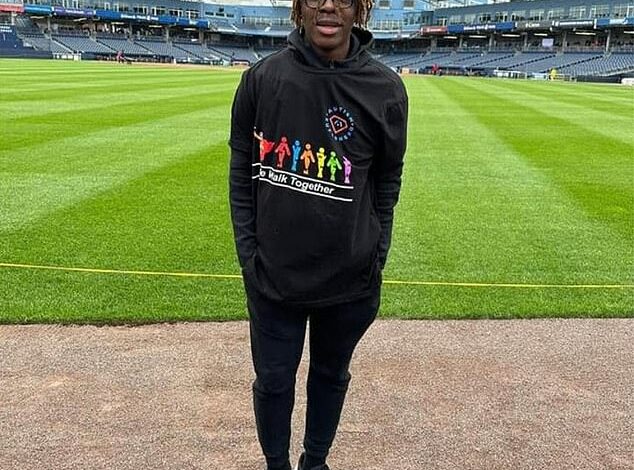Family of Massachusetts teen who died from spicy potato chips is suing company




The parents of a teenage boy who died after eating a spicy potato chip have filed a lawsuit against the company that makes the chips.
Harris Wolobah, a tenth-grader from Worcester, Massachusetts, died last September after eating a Paqui chip as part of the manufacturer’s “One Chip Challenge.”
An autopsy revealed that Wolobah, who had an underlying medical condition, suffered cardiac arrest caused by the high levels of chili pepper extract in the chip.
The family is suing Paqui, along with parent company Hershey, while Walgreens is also accused of misconduct in selling the chip to children. The family has declined to say whether they are seeking financial compensation.

Harris Wolobah, 14, died hours after eating a spicy tortilla chip as part of the “One Chip Challenge,” a social media trend that has racked up billions of views on TikTok. The Massachusetts teen was a talented athlete who was described by his family as “a light that lit up the room.”

The 2023 edition of the ‘One Chip Challenges’ will feature a tortilla chip with two of the spiciest peppers in existence, the California Reaper Pepper and the Naga Viper Pepper. The California Reaper is considered the world’s spiciest pepper
Paqui expressed his sadness at Wolobah’s death, but also noted the “clear and conspicuous labelling of the chip, which indicates that the product is not suitable for children or people who are sensitive to spicy food or who have underlying health conditions.”
The chip, which sold for about $10 each, came wrapped in aluminum foil in a coffin-shaped box with a warning that the chip was intended for “the vengeful pleasure of intense heat and pain.”
The warning stated that the chip is only intended for adults and should be kept out of reach of children.
Despite the warning, reports came in from across the country of teenagers falling ill after taking part in the chip-eating challenge.
Among them were three California high school students who were taken to the hospital and seven Minnesota students who were treated by paramedics after taking part in the 2022 challenge.
In this challenge, participants had to eat the Paqui chip and then see how long they could last without other food and water.
Sales of the chip appear to have increased largely because people posted videos on social media of themselves or their friends taking on the challenge.
They showed people, including children, unwrapping the package, eating the chips and then reacting to the heat. Some videos showed people gagging, coughing and begging for water.
Harris’ death prompted warnings from Massachusetts authorities and doctors that eating such spicy food could have unintended consequences.

Paqui, the chip’s manufacturer, encourages people to test their physical limits. Those who can endure the burning pain for up to an hour without food or drink earn the title of ‘Apex Predator’
Since the chip craze began, poison control centers have warned that the concentrated amounts can cause allergic reactions, breathing problems, irregular heartbeats and even heart attacks or strokes.
Harris’ mother said she received a call from the school nurse at Doherty High School on September 14 last year, saying her son had fainted after eating a chip his friend had given him.
After being sent home, Harris lost consciousness again and was taken to hospital, where he died.
Autopsy results released in May showed that Harris died of cardiac arrest “after recently ingesting a food containing a high concentration of capsaicin.”
The coroner also found that Harris had an enlarged heart and a congenital heart defect, which neither he nor his parents knew about.
Harris said he was in good health and enjoyed playing basketball. He dreamed of playing in the NBA.
The new lawsuit alleges that the amount of capsaicin (the chemical that gives chili peppers their heat) in the chip was hundreds of times spicier than a jalapeño.




